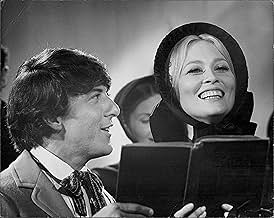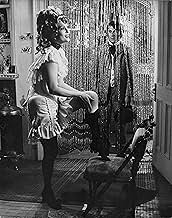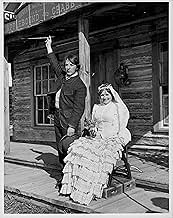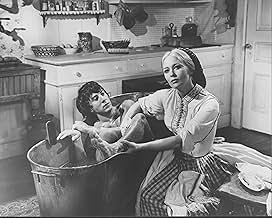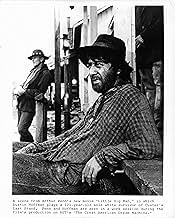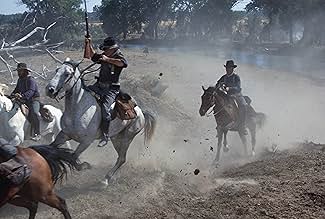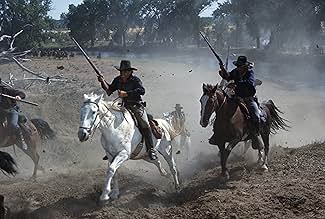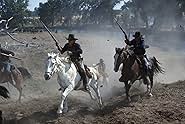L'histoire d'un visage pâle partagé entre ses origines et sa famille d'adoption, indienne.L'histoire d'un visage pâle partagé entre ses origines et sa famille d'adoption, indienne.L'histoire d'un visage pâle partagé entre ses origines et sa famille d'adoption, indienne.
- Director
- Writers
- Stars
- Nommé pour 1 oscar
- 5 victoires et 11 nominations au total
- Sunshine
- (as Amy Eccles)
- Caroline
- (as Carol Androsky)
- Lieutenant
- (as Jess Vint)
Avis en vedette
Critique: Extremely enjoyable, epic western directed by Arthur Penn. Praised for its depiction of Native Americans, it has biting satirical (and political) touches, saddled with farcical historical accounts of the Indian Wars. The once controversial aspects were meant to represent the ideologies of the time, but it has not lost any of its grit.
What I like the most is its unique interpretation of Indians. Never in the long cycles of American westerns were Indians presented as almost alien, coming across as a mythical people whose ignorance of political maneuvers and technology proved their downfall. A very bitter and sad farewell swansong to what war and genocide has taken away.
Atypical cast delivers strong passages but you won't forget the 2-standout roles of General Custer as portrayed by the maniacal Richard Mulligan and 'Old Lodge Skies' played by the philosophical Chief Dan George.
QUOTES: Old Lodge Skies: "There is an endless supply of white men. But there has always been a limited number of 'human beings'. We won today, we won't win tomorrow."
This is the story of Jack Crabb who begins the movie as a 121 year old man in a nursing home recounting his life.And what a life it was.He bounces back and forth in the Old west between the world of the white man and the world of the Native American.Crabb sees and does just about everything possible in both worlds.The joy and sadness and fun he has along the way makes for one helluva movie.
Dustin Hoffman is brilliant in this film.It may be his best performance ever yet it is somehow overlooked when many people think of his movies.It is a tour de force for Hoffman who plays an Indian and gunslinger and drunkard and muleskinner and many other things in this movie. Chief Dan George is nothing short of amazing in this movie.But yet one critic said he wasn't acting,he was just an Indian playing an Indian.Bah! Richard Mulligan was so perfect as General George Custer in this movie that he is who I see whenever I hear the name of Custer mentioned.Faye Dunaway and Martin Balsam create memorable characters too.
This movie makes one of the strongest statements I've ever seen about the treatment of the Native Americans yet you probably won't even realize it at the time.This is a movie that you'll replay in your head and then it hits you that there was even more there than met the eye.
The humor,tragedy and lush characters will stay with you long after you see this movie.This movie is based on the fine book by Thomas Berger and is very faithful to it.I recommend the book wholeheartedly, too.
The book is more human, giving each character Jack encounters three dimensions and avoiding the trap of rendering any of them either all good or all bad. The moment in Penn's film that best evoke the book is the scene where Custer catches Jack approaching to kill him and instead of killing his stalker, lets him go. Throughout this wonderful novel, characters do unexpected things that seem at first to be totally out of character, and thus serve to remind us of the complexity of human beings. As someone suggests here, the film may intend to say something about the random, unpredictable nature of the universe. The novel does something a lot more difficult and down-to-earth: It reminds us that it takes a lifetime to know even a few of our fellow humans. And especially for Jack, who has to navigate two distinct cultures.
So if you liked the movie, by all means read the book. You'll finish it loving this tall tale way more.
Poor Hoffman just can't find himself a niche in the world of the west either with white men or with Indians. He finds himself in the Dakota Territory of the 1870s and makes the acquaintance of such people as Wild Bill Hickok and George Armstrong Custer, a couple of old west legends who met famous premature deaths in the same year of 1876. And of course some lesser people in mostly low places.
Hoffman gets some great support from people like Martin Balsam as a medicine show conman whom he spends some time with and Faye Dunaway as the widow woman who takes the orphan Hoffman in and explains and demonstrates the facts of life. Jeff Corey plays Wild Bill Hickok who explains to Hoffman he really doesn't have the right stuff to be a gunfighter.
Best of all is Richard Mulligan as the controversial General George Armstrong Custer whose ambitions for military glory led to the massacre at Little Big Horn. Mulligan is ambitious and will not take good advice. Watching Little Big Man in the scenes with Mulligan it was like looking at Donald Trump campaigning for president. Just like The Donald, Mulligan will not listen to anyone other than himself. In fact you mostly have to use reverse psychology to get Mulligan to do things your way. Hoffman may be a misfit, not unlike his character in The Graduate, but he learns to play Mulligan like a piccolo.
Little Big Man is a different and entertaining look at the old west and Hoffman is superb. But the one to really watch in this is Richard Mulligan. He steals the film in whatever scene he's in.
Le saviez-vous
- AnecdotesThe role of Old Lodge Skins was initially offered to Marlon Brando, who turned it down. Other sources claim Arthur Penn's first choice for the role was Sir Laurence Olivier. When that didn't work out, Richard Boone was slated for the role. When Boone backed out at the last minute, Chief Dan George was given the part and earned an Oscar nomination.
- GaffesThe wires forcing a horse to fall are visible in the final battle scene, just before Custer exclaims "Fools! They're shooting their own horses!"
- Citations
Jack Crabb: Do you hate them? Do you hate the White man now?
Old Lodge Skins: Do you see this fine thing? Do you admire the humanity of it? Because the human beings, my son, they believe everything is alive. Not only man and animals. But also water, earth, stone. And also the things from them... like that hair. The man from whom this hair came, he's bald on the other side, because I now own his scalp! That is the way things are. But the white man, they believe EVERYTHING is dead. Stone, earth, animals. And people! Even their own people! If things keep trying to live, white man will rub them out. That is the difference.
- ConnexionsFeatured in Arthur Penn: The Director (1970)
- Bandes originalesBringing In the Sheaves
(1880) (uncredited)
Music by George A. Minor (1880)
Hymn by Knowles Shaw (1874)
Sung a cappella by Faye Dunaway
Meilleurs choix
- How long is Little Big Man?Propulsé par Alexa
Détails
- Date de sortie
- Pays d’origine
- Langue
- Aussi connu sous le nom de
- Little Big Man
- Lieux de tournage
- sociétés de production
- Consultez plus de crédits d'entreprise sur IMDbPro
Box-office
- Budget
- 7 000 000 $ US (estimation)
- Brut – États-Unis et Canada
- 31 559 552 $ US
- Brut – à l'échelle mondiale
- 31 559 552 $ US

